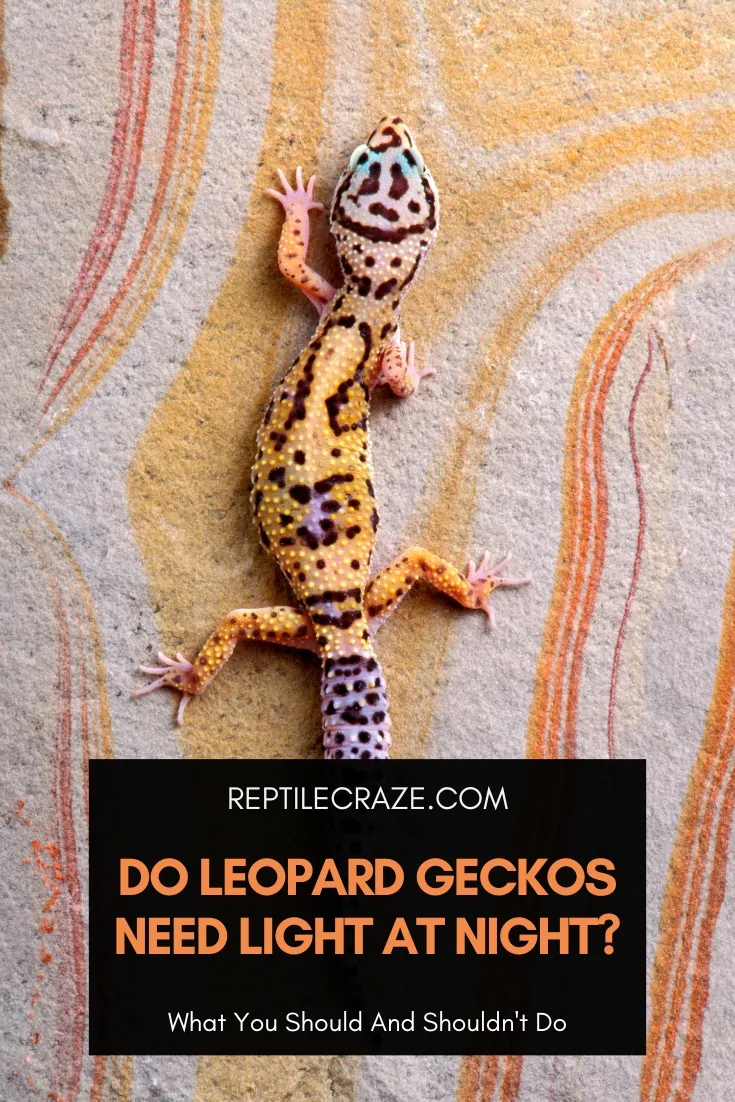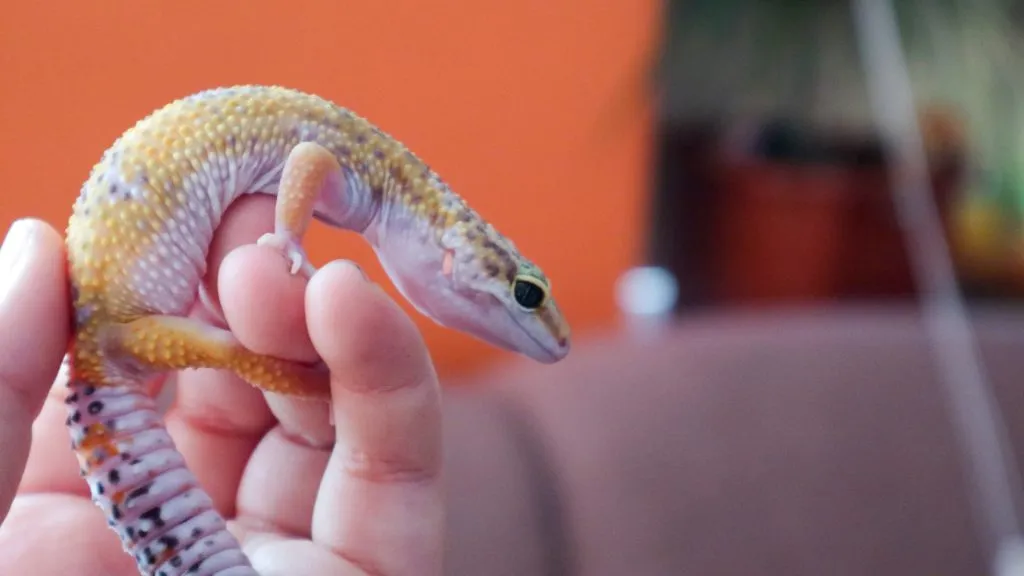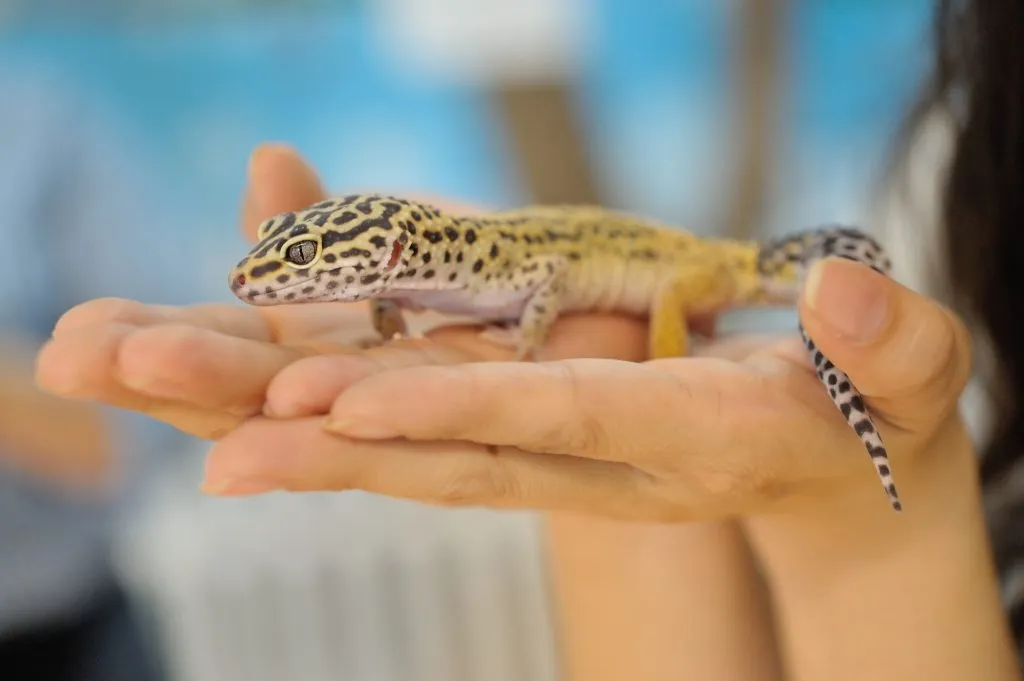
Are you wondering if your leopard gecko needs light at night? After all, that is when they are awake and active. So maybe light would be good for them?
Leopard geckos do not need light at night. These reptiles have excellent night vision and have evolved to hunt, explore and interact with their environment in the dark. Light at night can be harmful to them, as it will disrupt their natural circadian rhythms and lead to stress or sickness.
In this article, we will discuss the do’s and don’ts of using lights in leopard gecko tanks at night. Read on to learn more, and to make sure you are providing the best care for your gecko.
Table of Contents
Do Leopard Geckos Need A Night Light?
Leopard geckos are crepuscular, meaning they are most active at dusk and dawn. They have evolved to take advantage of the night to hunt and stay safe from predators.
While they are most active at dusk and dawn, they are active during the night as well. However, because they are adapted to low light conditions, leopard geckos don’t need light at night for them to be able to see to move around, eat, hunt, and mate.
In fact, providing them a light at night may be disruptive to their natural behavior, since they use daylight to set their sleep-wake cycle (circadian rhythm).
Leopard geckos sleep during daylight hours, so a night light will make them feel like it is time to sleep when they should be awake.
What Time Should I Turn My Leopard Gecko’s Light Off At Night?
Leopard geckos originate from the Middle East and Asia, in regions where days are 14-15 hours long in the summer and 9-10 hours long in the winter. Their habitat lighting cycle should be set so it also varies according to season.
We recommend using an automatic timer (like this one) and setting it to have their lights turn on at 8 AM and turn off at 10 PM during the summer, and decreasing this during the winter to have the lights turn off at 8 PM.
This will give your geckos 14 hours of daylight in summer and 12 in the winter.
However, when transitioning between summer and winter lighting, do not just switch from one lighting cycle to the other. You still need to mimic the natural progression of seasons and change the lighting by just a few minutes each day over at least four weeks.
More details on when is the best time to turn off your gecko’s light can be found here.

I Left My Leopard Gecko’s Lights On All Night! What Now?
If you accidentally left your leopard gecko’s lights on all night, that’s ok. They will be fine and this is not something to worry about. They may not be as active for a day or two, but it won’t take long for them to get back to normal.
Do not make the mistake, though, of turning off the lights during the day to make up for having the lights on all night. This is just magnifying the problem, as now you have just turned their whole lighting cycle upside down.
Instead, just stick to the lighting schedule that you have set, and make sure not to forget to turn it off at night. Your leopard gecko will adjust and get back on track with its natural sleep-wake cycle in no time.
Will My Leopard Gecko Be Too Cold Without A Night Light?
If you don’t provide any other source of heat, then it is possible for their habitat to get too cold at night when the lights are off. But for the reasons already discussed, using a light at night to provide the needed heat is not a good idea.
Leopard geckos need the following temperature ranges in their

To provide your leopard gecko with the heat it needs, use a combination of a heat lamp and this heat mat. The heat lamp will provide the heat it needs during the day, and when it turns off at night then the heat mat is there to provide the needed heat.
You can learn more about leopard gecko heating needs and how to make sure they have the right temperatures by reading our article Do Leopard Geckos Need A Heat Lamp?
Do Leopard Geckos Need Complete Darkness At Night?
Since the leopard gecko’s preferred active time is dusk and dawn, it is evident that they are most comfortable in low-light situations. This might lead you to think that they would prefer to have that type of light all night long, but you’d be wrong.
Leopard geckos need darkness to keep their sleep-wake cycle in check. Any light, even a dim blue light, will interfere with this. Think “night sky” in terms of how much light is too much. Moon and stars only – anything more is too much.
If you live on a street with bright street lights that shine in your window you will need to make sure that your leopard geckos are not exposed to that light.
Use blackout curtains or blinds, and/or make sure their tanks are placed away from any windows where direct light may enter.
Few homes are completely dark these days. From the light from digital clocks to the status lights on our electronics, home are full of little lights. These small lights are ok and will not interfere with the leopard gecko’s sleep-wake cycle.
What About Blue Lights?
Some owners like to have a blue light in their gecko’s
However, a blue light that is left on all night long is not good for the geckos, as it provides too much light. To the gecko, it is like having twilight all night long, which is something that should be avoided.
If you want to use a blue light so you can see your geckos after lights out, use it for only short periods (no longer than two hours) and then turn it off.
Make a habit of double-checking that these lights are off before you go to bed, to ensure the light does not stay on all night long.
Do I need To Leave The Light On After Feeding My Leopard Gecko?

With many reptiles, the recommendation is to leave the lights on for at least an hour after they eat. They need to be warm to properly digest their
In the case of leopard geckos, the best time to feed a leopard gecko is in the early evening, right after they become active. Their habitat lights may have already automatically turned off by then.
You don’t want to be turning on the light again to feed them, and you certainly shouldn’t leave the light on after they have eaten.
They do still need to be warm enough to digest their
Tip: Also read our article on how well leopard geckos can see in the dark!
Conclusion
Leopard geckos do not need light at night, as they need darkness to keep their sleep-wake cycle in check. If you need to provide them with some light so that you can see them after lights out, use a blue light for only short periods and make sure it’s off before bedtime.
Also, there is no need to leave the lights on after feeding them. Use a warming mat to make sure your leopard gecko has a warm basking place so it can digest its food properly.
Following these directions will ensure your leopard gecko is living in an environment that best mimics its natural habitat, helping to keep it healthy and happy.
- Enchi Ball Python: A Unique and Stunning Morph of Python regius - March 27, 2025
- Emerald Tree Monitor: The Enigmatic Green Guardian of the Rainforest - March 26, 2025
- The Egyptian Cobra (Naja haje): A Fascinating Serpent - March 25, 2025
